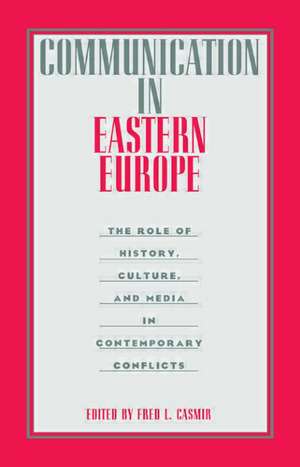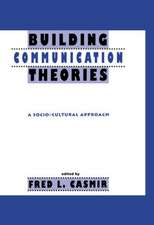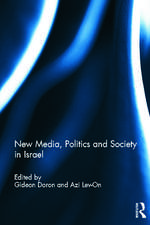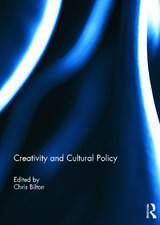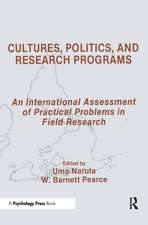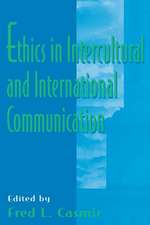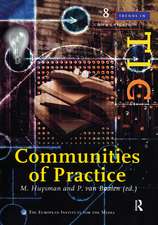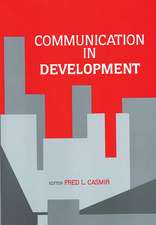Communication in Eastern Europe: The Role of History, Culture, and Media in Contemporary Conflicts: Routledge Communication Series
Editat de Fred L. Casmiren Limba Engleză Paperback – 12 dec 2011
This book is not merely based on the study of select groups of university students or on laboratory settings created in the minds of social scientists. It seeks to understand some of the "real world," including the historical backgrounds and the theoretical assumptions brought to studies of intercultural conflicts. Using personal and professional insights developed during firsthand contacts with existing situations, chapter authors illustrate some of the realities by using the complexity of changes in Eastern European states during the final decade of the 20th century. From education to business, from the role of women to the role of mass media, from the impact of political systems to the impact of history, communication between those who are culturally diverse, though they may have been arbitrarily forced to live under the same "political roof," is the theme of these scholarly studies.
The editor's reason for developing this volume of original essays is his belief that diversity rather than assumed similarity or even sameness -- based on the use of inadequate terminology -- is necessary for learning from contemporary human experiences. He further believes that diversity and the significant roles of cultural values as well as of history need to become key concepts in the model with which to begin when it comes to the study of various aspects of intercultural communication. It is therefore vital that scholars who represent various points of view and backgrounds contribute to that process. After all, understanding what is happening in the world is centrally anchored in or related to effective and successful "intercultural" communication between scholars who have different academic and personal backgrounds.
Din seria Routledge Communication Series
- 9%
 Preț: 575.55 lei
Preț: 575.55 lei - 9%
 Preț: 576.44 lei
Preț: 576.44 lei -
 Preț: 155.44 lei
Preț: 155.44 lei - 8%
 Preț: 495.23 lei
Preț: 495.23 lei - 8%
 Preț: 417.13 lei
Preț: 417.13 lei - 15%
 Preț: 404.22 lei
Preț: 404.22 lei -
 Preț: 392.97 lei
Preț: 392.97 lei - 8%
 Preț: 516.78 lei
Preț: 516.78 lei -
 Preț: 171.85 lei
Preț: 171.85 lei - 8%
 Preț: 509.91 lei
Preț: 509.91 lei - 8%
 Preț: 460.12 lei
Preț: 460.12 lei - 8%
 Preț: 394.36 lei
Preț: 394.36 lei -
 Preț: 424.75 lei
Preț: 424.75 lei - 15%
 Preț: 431.10 lei
Preț: 431.10 lei -
 Preț: 364.94 lei
Preț: 364.94 lei -
 Preț: 363.96 lei
Preț: 363.96 lei - 22%
 Preț: 325.34 lei
Preț: 325.34 lei - 15%
 Preț: 463.49 lei
Preț: 463.49 lei - 15%
 Preț: 467.42 lei
Preț: 467.42 lei -
 Preț: 366.85 lei
Preț: 366.85 lei -
 Preț: 264.53 lei
Preț: 264.53 lei - 16%
 Preț: 247.75 lei
Preț: 247.75 lei -
 Preț: 354.28 lei
Preț: 354.28 lei -
 Preț: 374.27 lei
Preț: 374.27 lei - 22%
 Preț: 321.54 lei
Preț: 321.54 lei -
 Preț: 421.07 lei
Preț: 421.07 lei -
 Preț: 481.52 lei
Preț: 481.52 lei -
 Preț: 442.50 lei
Preț: 442.50 lei -
 Preț: 498.91 lei
Preț: 498.91 lei -
 Preț: 369.95 lei
Preț: 369.95 lei - 24%
 Preț: 133.28 lei
Preț: 133.28 lei - 31%
 Preț: 325.43 lei
Preț: 325.43 lei - 25%
 Preț: 769.37 lei
Preț: 769.37 lei -
 Preț: 447.05 lei
Preț: 447.05 lei - 18%
 Preț: 722.88 lei
Preț: 722.88 lei -
 Preț: 389.60 lei
Preț: 389.60 lei -
 Preț: 249.75 lei
Preț: 249.75 lei -
 Preț: 395.37 lei
Preț: 395.37 lei -
 Preț: 363.96 lei
Preț: 363.96 lei - 18%
 Preț: 1004.72 lei
Preț: 1004.72 lei - 18%
 Preț: 998.71 lei
Preț: 998.71 lei -
 Preț: 380.22 lei
Preț: 380.22 lei - 26%
 Preț: 243.26 lei
Preț: 243.26 lei -
 Preț: 102.17 lei
Preț: 102.17 lei -
 Preț: 242.11 lei
Preț: 242.11 lei - 20%
 Preț: 402.68 lei
Preț: 402.68 lei -
 Preț: 226.33 lei
Preț: 226.33 lei -
 Preț: 386.14 lei
Preț: 386.14 lei -
 Preț: 241.09 lei
Preț: 241.09 lei - 18%
 Preț: 961.37 lei
Preț: 961.37 lei
Preț: 445.36 lei
Nou
Puncte Express: 668
Preț estimativ în valută:
85.23€ • 88.65$ • 70.36£
85.23€ • 88.65$ • 70.36£
Carte tipărită la comandă
Livrare economică 15-29 aprilie
Preluare comenzi: 021 569.72.76
Specificații
ISBN-13: 9780415515627
ISBN-10: 0415515629
Pagini: 364
Dimensiuni: 152 x 229 x 19 mm
Greutate: 0.67 kg
Ediția:1
Editura: Taylor & Francis
Colecția Routledge
Seria Routledge Communication Series
Locul publicării:Oxford, United Kingdom
ISBN-10: 0415515629
Pagini: 364
Dimensiuni: 152 x 229 x 19 mm
Greutate: 0.67 kg
Ediția:1
Editura: Taylor & Francis
Colecția Routledge
Seria Routledge Communication Series
Locul publicării:Oxford, United Kingdom
Public țintă
ProfessionalCuprins
Contents: Preface. Part I: Foundational Issues. T. Stephen, Interpersonal Communication, History, and Intercultural Coherence. Part II: Germany and Unification. F.L. Casmir, "Wir sind ein Volk": Illusions and Reality of German Unification. M. Boyle, The Crisis of Citizenship: The East German Media, Nazis, and Outsiderness. D.J. Rosenberg, Stepsisters: On the Difficulties of German-German Feminist Cooperation. Part III: Hungary: Restructuring a Society and Its Economy. M.M. McKinley, Hungarian Culture in Communication. C.C. Rohde, C.R.C. Pellicaan, Advertising and the Legitimacy Crisis of Eastern Europe. Part IV: Complexities of Change: Other Eastern European Examples. S.R. Olson, New Democratic Vistas: Demassification and the Polish Media. E. Gilder, Turning Personal Experiences Into Social Reality: Communication as a "Third-Culture-Building" Tool in the Romanian Classroom. D. Iordanova, Media Coverage of Bulgaria in the West and Its Domestic Use. C.Q. Adade, Africa, the Kremlin, and the Press: The Russian Soul Comprehending and Communicating the African Spirit. D.E. Williams, Probing Cultural Implications of War-Related Victimization in Bosnia-Hercegovina, Croatia, and Serbia. F.L. Casmir, Some Summary Thoughts.
